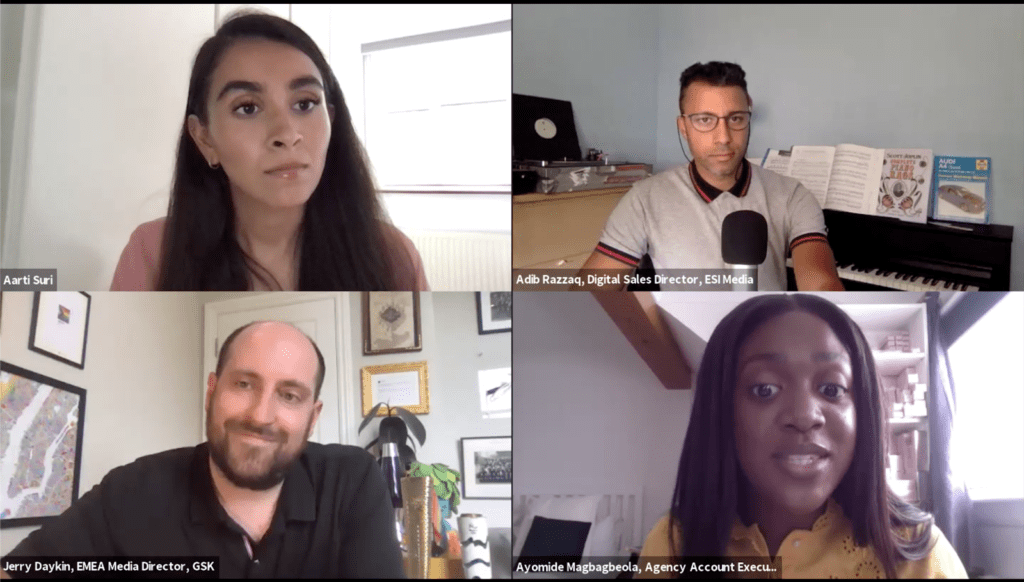|
Getting your Trinity Audio player ready...
|
A “perfect storm” of events including the Black Lives Matter movement and Covid-19 has elevated the importance of premium publishers in the eyes of advertisers and agencies, but more must be done to ensure the internet delivers a better deal for everyone.
This was the view of panellists on ‘Advertiser boycotts, what do they mean for publishers and inclusivity?’, a virtual roundtable hosted by publisher data platform Permutive.

Initiatives such as the Facebook boycott, which saw more than 500 brands press pause on activity for the month of July, were a great start – but only that.
Said Jerry Daykin, GSK media director for EMEA, “[The boycott] really got a lot of advertisers thinking about the fact that their advertising dollars quite literally fund the internet. It’s an investment in your brands, but it’s an investment in the internet as well.
“The bigger picture is about where all of our money goes. It is almost a perfect storm in the industry at this moment with Black Lives Matter, Covid and everything else that is happening,” he said, adding that advertisers were already “wary about the digital supply chain and the value of different types of content”.
He continued: “It’s a good opportunity to pause and ask ourselves whether a celebrity plastic surgery slideshow website can be valued as equally as something that is a very high quality portfolio. Are you equally happy funding those two things, quality journalism versus click bait?”
Daykin was joined by Ayomide Magbagbeola, Future plc agency account executive and Adib Razzaq, digital sales director for ESI Media, in a debate moderated by Aarti Suri, Permutive senior customer success manager.
Razzaq said: “Rather than a boycott, this has got to be a strategy. It has to be a way in which we buy our media and build that into the day-to-day, rather than a month-long initiative.”
He said that whilst the top 100 advertisers only provided around 6%, or $4.2bn of Facebook’s revenues last year, they had a duty to make “much more of an impact in terms of the principles and in terms of the fact that these big, huge global brands that we all know and love are actually doing something”.
Magbagbeola concurred, adding that publishers also had an important role “especially because so many consumers are coming to these websites to hear about news”. She said: “What I liked about this boycott in particular is advertisers were really understanding about why they don’t want to be surrounded by certain types of hate speech, for instance.”
It was incumbent on publishers to create those brand safe environments for publishers, while also ensuring they were covering the topics that mattered, such as content around Black Lives Matters. “I think it’s a great wake-up call for brands, who are starting to get a picture of the content that they want to be around,” added Magbagbeola.
However, quality journalism costs a lot to produce. “The digital business model doesn’t quite fund it in the way that print does because of the disparity between CPMs and CPTs,” said Razzaq, who also pointed to the debilitating effect that crude keyword blocklists had on publisher revenues.
“There was a period of two months where there was nothing but Covid related news,” he said, though not all of the content was negative, nor that of the BLM movement. “Agencies have to look more semantically about the way they approach content that might seem at the top level to be contentious.”
As Daykin pointed out, advertisers shied away from content produced by premium publishers online that they would not necessarily do so in print or on the television. He believed that advertisers should pay a price premium to advertise in quality environments because of the better attention and effectiveness.
The panel also praised initiatives such as ‘Inclusive PMPs’, where agencies including Havas and Mindshare were increasing the flow of ad spend to publishers focused on black, Hispanic, and LGBTQ+ communities.
Magbagbeola said: “It’s a really good step, especially because not a lot of our voices are really being heard. I think people always think that we want to talk about more political stories, but I also want to share about my haircare journey. I want to share about the makeup I use. To realise this is something strategic that will give advertisers alternatives to platforms such as Facebook.”
GSK was partnering with Gay Times in the UK, said Daykin, amongst other initiatives. “We are definitely looking at a world in which we require a sum of all our media to go to positively fund diverse voices.”
Those voices sometimes existed on very specific or niche publisher platforms, but it was incumbent for the mainstream media to positively cover such topics – and for advertisers to be willing to appear alongside it and push for that content. “Be more brazen and bold,” he urged.
The discussion turned inwards, to how the advertising industry could attract, promote and support diverse talent in their companies. That went from ensuring young minority and socially disadvantaged people believed they could enter the industry, to hiring policies and ensuring the C-suite was well represented. This, in turn, would build better – and more successful – businesses.
Suri said that the McGregor Smith review noted that if black and ethnic minority talent was fully utilised the UK economy would see a £24bn boost.
Magbagbeola urged companies to stage more events, networks and initiatives such as cultural awareness training. She had just staged a Black History Month at work, but cautioned: “It is important that we all have a voice and are able to share all the time, not just for one month of the year.”
The virtual event can be viewed in its entirety using this link.



